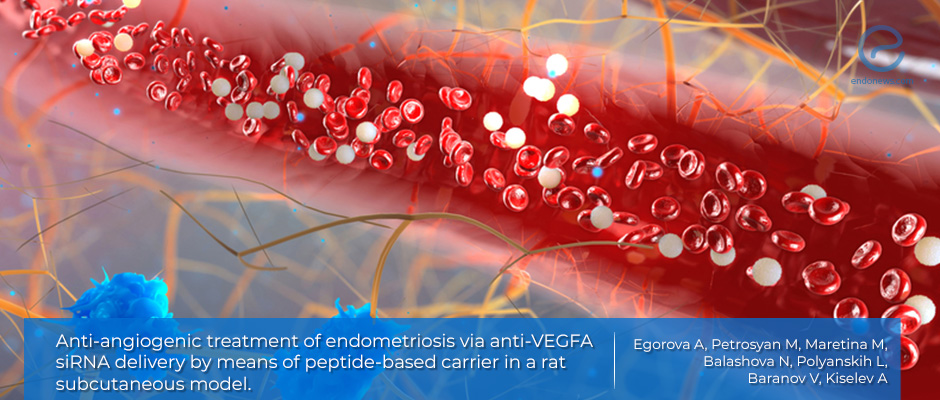Anti-angiogenic treatment for endometriosis
May 13, 2019
A promising anti-VEGFA siRNA delivery system for anti-angiogenic endometriosis treatment in mice
Key Points
Highlight:
- Dr. Kiselev group demonstrate the efficiency of anti-angiogenic treatment for endometriosis in mice.
- In this study, they present the potential of a specific non-viral anti-VEGFA siRNA delivery system, with L1 peptide-based carrier.
Background:
- The wide variety of surgical and medical treatment has been applied for treating endometriosis, but a definitive therapy has not been achieved so far. New therapeutic strategies need to be developed.
- Gene therapy, using specific receptor to increase specificity, recently has shown to be practically attainable for endometriosis.
- Dr. Kiselev group, Ott Research Institute from Russia, previously developed chemokine receptor type 4 (CXCR4)-targeted siRNA carrier and suggested possibilities in endometriosis treatment.
- In this study, the same group developed a non-viral siRNA vehicle for inhibition of ectopic vascularization of endometriosis, using in vivo system.
Key points:
- Authors evaluated the L1 carrier as a non-viral vector for anti-VEGFA siRNA delivery into endometrial implants in the rat endometriosis model created by subcutaneous auto-transplantation.
- After in vivo administration of the above vector, the growth of endometriotic lesions was significantly reduced (55-60%).
- Approximately two-fold decreased VEGFA gene expression confirmed by real-time reverse transcriptase-PCR analysis, compared to controls.
- Immunohistochemical examination of endometriotic lesions showed significant anti-angiogenic effects of anti-VEGFA siRNA/L1 polyplexes.
Conclusions:
- L1 peptide-based carrier was capable to provide efficient anti-VEGFA siRNA delivery into endometriotic lesions in vivo in mice.
- Furthermore, this anti-VEGFA siRNA delivery system could be used as an anti-angiogenic treatment for endometriosis in the future.
Lay Summary
Endometriosis is a benign, estrogen-dependent gynecological disorder. The wide variety of surgical and medical treatment has been applied for treating endometriosis, but a definitive therapy has not been achieved so far. Thus, new therapeutic strategies need to be developed.
Among them, gene therapy recently has shown that it can be practically attainable for endometriosis. Especially, developing a delivery system using cell-specific receptors is getting more attention to increase the specificity of gene therapy. Dr. Kiselev group, Ott Research Institute from Russia, previously developed chemokine receptor type 4 (CXCR4)-targeted siRNA carrier. CXCR4 is a receptor expressed in the endothelium of angiogenic vessels and they observed efficient RNAi-mediated down-regulation of VEGFA gene expression in endothelial cells. This finding led the group to explore more possibilities in endometriosis treatment whose development highly depends on angiogenesis and angiogenesis-associated events.
In this study, this group developed a non-viral siRNA vehicle for inhibition of ectopic vascularization in vivo endometriosis model. The paper was published in the journal "Gene Therapy".
Firstly, the authors evaluated the L1 carrier as a non-viral vector for anti-VEGFA siRNA delivery into endometrial implants in the rat endometriosis model, which was created by subcutaneous auto-transplantation of uterus fragments. After in vivo administration of anti-VEGFA siRNA, the growth of endometriotic lesions was significantly reduced (55-60%). Also, compared to control, the level of VEGFA gene expression was approximately two-fold decreased confirmed by real-time reverse transcriptase-PCR analysis. Results of immunohistochemical examination of endometriotic lesions showed significant anti-angiogenic effects of anti-VEGFA siRNA/L1 polyplexes.
In conclusion, these results confirm that L1 peptide-based carrier was capable to provide efficient anti-VEGFA siRNA delivery into endometriotic lesions in vivo in mice. Furthermore, it demonstrates this anti-VEGFA siRNA delivery could be used as an anti-angiogenic treatment for endometriosis in the future.
Research Source: https://www.ncbi.nlm.nih.gov/pubmed/30254304
Endometriosis Anti-angiogenic treatment Gene therapy Anti-VEGFA Peptide-based carrier

